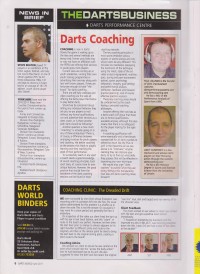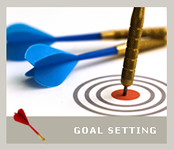
Coaching in Darts
Posted: 20.06.11 in Darts Performance Centre Blog category
This blog is our thoughts on where the Darts World stands with darts coaching at the moment and how it may progress...
Welcome to The Darts Performance Centre Darts Blog
Coaching is new in darts! Slowly the game is waking up to the idea and several methods are being tried. Former pro`s (who may or may not have an affiliation with the P.D.P.A) are offering their services to guide grass-roots players, current stars are turning up at youth academies, running their own youth training programmes or advertising their services along with less well known players as they are fortunate enough to have “the knack” for darts coaching. There are self-help websites and video coaching via the web all offering the dart player the chance to play better darts. Should we be concerned about letting any individual (whether they are pro, ex pro players or not) without any formal qualifications run and advertise their services as a darts coach or is there another path darts should be following?
Another question is how much “coaching” is actually going on in any of these enterprises? There is of course a difference between arranging matches for youth players and coaching. We define coaching as the process that leads to players learning and then reaching the peak of their performance.
To successfully teach in any sport a coach needs a good knowledge of sound coaching principles. Each sport does of course have its own unique features, however, the good practice that should form the backbone of the darts coaching sessions can be found in most other coaching manuals The key coaching principles in most sports embrace various aspects of sports science and why should darts be any different? This includes bio-mechanics (analysing the mechanics of the technique using the latest, state of the art video analysis equipment), nutrition, (pre, during and post tournament advice), sports psychology (relaxation, imagery, goal setting) and performance analysis (reflection, feedback and forward practice planning) and of course effective practice sessions. These key coaching areas should be underpinned by the coach having a personal coaching philosophy.
Anyone offering their services as a darts coach will of course argue that there are no formal qualifications available anyway although this also means that there is no safeguard for the player looking for the right advice. A coaching qualification will arrive eventually and a benchmark standard set for all darts coaches to adhere to, much like the PGA in golf; in the meantime all we can advise is to “interview” anyone claiming they can improve your darts to try to find out exactly what skills they possess that will be effective in improving your own technique. We would also urge “darts coaches” to publish what they are doing. Without this transparency how else will darts coaching move forward?
This article was first published in the June edition of Darts World
The Darts Performance Centre is a resource to assist dart players of all standards play better darts. We are also committed to researching all aspects of darts to provide players with information and solutions that most other sports take for granted. Please support us by joining today.Membership is £25.00 per annum.
You can register to receive our monthly newsletters and download our Darts Philosophy poster here. You will also be able to get more information on becoming a full member.
Post by Category
Posts by Month
- November 2025
- October 2025
- September 2025
- August 2025
- July 2025
- June 2025
- May 2025
- April 2025
- March 2025
- February 2025
- January 2025
- December 2024
- December 2024
- November 2024
- October 2024
- September 2024
- August 2024
- July 2024
- June 2024
- May 2024
- April 2024
- March 2024
- February 2024
- January 2024
- December 2023
- December 2023
- November 2023
- October 2023
- September 2023
- August 2023
- July 2023
- June 2023
- May 2023
- April 2023
- March 2023
- February 2023
- January 2023
- December 2022
- December 2022
- November 2022
- October 2022
- September 2022
- August 2022
- July 2022
- June 2022
- May 2022
- April 2022
- March 2022
- February 2022
- January 2022
- December 2021
- December 2021
- November 2021
- October 2021
- September 2021
- August 2021
- July 2021
- June 2021
- May 2021
- April 2021
- March 2021
- February 2021
- January 2021
- December 2020
- December 2020
- November 2020
- October 2020
- September 2020
- August 2020
- July 2020
- June 2020
- May 2020
- April 2020
- March 2020
- February 2020
- January 2020
- December 2019
- December 2019
- November 2019
- October 2019
- September 2019
- August 2019
- July 2019
- June 2019
- May 2019
- April 2019
- March 2019
- February 2019
- January 2019
- December 2018
- December 2018
- November 2018
- October 2018
- September 2018
- August 2018
- July 2018
- June 2018
- May 2018
- April 2018
- March 2018
- February 2018
- January 2018
- December 2017
- December 2017
- November 2017
- October 2017
- September 2017
- August 2017
- July 2017
- June 2017
- May 2017
- April 2017
- March 2017
- February 2017
- January 2017
- December 2016
- December 2016
- November 2016
- October 2016
- September 2016
- August 2016
- July 2016
- June 2016
- May 2016
- April 2016
- March 2016
- February 2016
- January 2016
- December 2015
- December 2015
- November 2015
- October 2015
- September 2015
- August 2015
- July 2015
- June 2015
- May 2015
- April 2015
- March 2015
- February 2015
- January 2015
- December 2014
- December 2014
- November 2014
- October 2014
- September 2014
- August 2014
- July 2014
- June 2014
- May 2014
- April 2014
- March 2014
- February 2014
- January 2014
- December 2013
- December 2013
- November 2013
- October 2013
- September 2013
- August 2013
- July 2013
- June 2013
- May 2013
- April 2013
- March 2013
- February 2013
- January 2013
- December 2012
- December 2012
- November 2012
- October 2012
- September 2012
- August 2012
- July 2012
- June 2012
- May 2012
- April 2012
- March 2012
- February 2012
- January 2012
- December 2011
- December 2011
- November 2011
- October 2011
- September 2011
- August 2011
- July 2011
- June 2011
- May 2011
- April 2011
- March 2011
- February 2011
- January 2011
- December 2010
- December 2010
- November 2010
Main Index









.jpg)